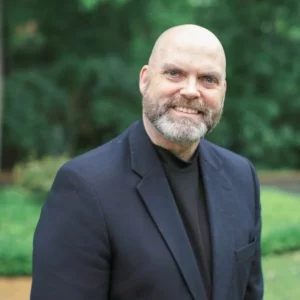The Babylon Bee, a satirical website that pokes fun at Christian culture, recently posted a marvelously ironic “news piece” with this heading: “Pastor Surprised to Learn His Church Has Statement of Faith.” Surely this piece was inspired by the current Methodist conversation. In my own interactions with those reading my posts, I’ve received comments like, “Who are you to decide what ‘orthodox’ is?” The same has been asked about Wesleyanism, Methodism, and even truth in general. I hear echoes of Pilate’s question to Jesus: “What is truth?”
In fact, these terms have accepted meanings. Our Articles of Religion define what it means to be Methodist. Wesley’s sermons interpret those articles into practical living. We have a doctrine that reflects the thinking of generations; this is the substance of Wesleyan orthodoxy. It is not purely theoretical but the kind of religion James discussed: the capacity to serve others without letting the world get the best of us (James 1:27).
To allow a non-theological culture to redefine our terms would be foolish and yet this is the plague that has befallen United Methodism and the root cause of our severe sickness. We have forgotten that we are creedal, doctrinal and covenantal, and that our beliefs are to be lived out for the transformation of the world.
Hear that: we transform the world, not vice versa.
What makes Wesleyanism so attractive is its insistence that its doctrines remain married to its practice. Wesley preached what he called a “practical divinity” or an “experimental divinity.” A Latin term — consensus fidelium, or “the sense of the faithful” — holds in tension the Spirit-infused experience of the believer with the scripturally-grounded doctrines of the Church.
Don Haynes has written eloquently on this theological vision of Wesley in a piece entitled “Wesley’s Consensus Fidelium” and it is my privilege to share Haynes’ good word here. I encourage you to read on and recommit yourself in this season to becoming a student of the Articles, sermons, notes and creeds that form our theological foundation as a people called Methodist.
Wesley’s consensus fidelium
In Dr. Robert Cushman’s book, John Wesley’s Experimental Divinity, he reminds us with much sadness that somewhere during the late 19th century, Methodism lost touch with the doctrinal foundation laid by Wesley’s Sermons and Notes. Cushman notes that the earliest Form of Discipline was most certainly doctrinally substantive — an “experimental divinity” rooted in scripture but lost by “a failure of memory.”
Cushman points us through consistent references by Coke, Asbury, Whatcoat and McKendree to a common canonical history of American Methodism. This paragraph appeared originally in the Form of Discipline published immediately following the Christmas Conference:
“Far from wishing you to be ignorant of any of our doctrines, or any part of our discipline, we desire you to read, mark, learn, and inwardly digest the whole. We know you are not able to purchase many books; but you ought, next to the Word of God, to procure the Articles and Canons of the Church to which you belong.”
For Wesley, and somewhat uniquely so, “doctrine called for or presupposed an appropriate discipline by which its truth might be nurtured and become a biographical reality.”
Consistently combining “doctrine and discipline” sets us apart from those who concentrate only on belief.. For Wesley and the next generation, Methodism was marked by a tri-fold commitment: belonging (to a Society or class meeting), believing (in the Edwardian Homilies doctrines), and behaving (in accordance with the General Rules).
To the generation of Calvinists who excommunicated Jacob Arminius posthumously by the Council of Dort for his belief in a modicum of free will. To that generation of Calvinists, behavior meant little or nothing; orthodox belief was the summon bonum of being a Christian. For Wesleyans, our received doctrinal tradition is a “living faith”—a “practical divinity,” an “experimental divinity.” (“Living faith” is a term Wesley lifted from the Edwardian Homilies of the early 1550’s Protestant Era in England.)
A significant dimension of what Cushman has uncovered as “consensus fidelium” was what Wesley called “holy living.” He never let that go even after Aldersgate brought the “strangely warmed heart”– forgiveness of sins and reconciliation to God issued forth in a divinely supplied “blessed assurance” that “Jesus is mine.” As United Methodists, we must not let go what Paul articulated irrevocably in Romans 8:16 —“the Spirit bearing witness with our spirit that we are children of God….” These are the foundational beliefs that constituted our consensus fidelium — our common consent to be shared in faith, hope, and love. This the preachers called “Wesley’s little body of divinity” or his “Scriptural Way of Salvation.”
Until 1808, the Methodist Episcopal Church had no constitution. When that was adopted, there were Restrictive Rules limiting what Cushman called a “dimming, or decline, or erosion of that consensus fidelium.” He wrote further, and prophetically, that such changes would create a “negative prognosis for the survival of that church, particularly in modern secular society.”
Cushman then wrote, “It is then to be pondered in the absence of a consensus fidelium (that is a common sum of doctrines and discipline acknowledged by most), whether a Christian community can attain to or retain a manifest identity and self-understanding, or convey a recognizable or enduring message or indeed, survive at all.” The obvious intent of the First Restrictive Rule of 1808 was to secure the aforestated consensus fidelium as the normative faith for the “Scriptural Way of Salvation,” vivified through the inner working of the Holy Spirit. What some call Wesley’s unique contribution to Christian journeying is the sanctifying or perfecting grace that follows one’s experience of saving grace. Wesley called this a walk of faith that became “inner and outward holiness in heart and life.” It was basic to that early consensus fidelium.
In Wesley’s sermon, “The Way To The Kingdom,” he preached, “For neither does religion consist in orthodoxy or right opinions… which are not of the heart. A man may be orthodox in every point; he may not only espouse right opinions, but zealously defend them against all opposers; he may think justly concerning the incarnation of our Lord, concerning the ever blessed Trinity, and every other doctrine contained in the oracles of God. He may assent to all three creeds—the Apostles’, the Nicene, and the Athanasian—and yet ‘tis possible he may have no religion at all, no more than a Jew, Turk, or pagan. He may be almost as orthodox as the devil…and may all the while be a stranger as he is to the religion of the heart.”
After asking, “If not orthodoxy as the criterion of faith, what was?” Jason Vickers has written that Wesley’s response would be “the testimony of the Spirit.” Wesley wrote, “We must love God before we can be holy at all. We cannot know his love for us until his Spirit witnesses to our spirit.” Then he cautioned that the “testimony of the Spirit” must be held in conjunction with the fruit of the Spirit, and he then quotes from St. Paul’s list of fruits.
Cushman taught his students that “We have a consensus fidelium that we call ’rule of doctrine and discipline.’ It is two-fold. We must always distinguish between fides quae creditor (faith that is only believed) and fides qua creditor (living or saving faith). This latter dimension, Wesley called “taking the cure” as he loved to call Jesus, “the great physician of souls.” If we can no longer encourage the work of the Spirit in taking the cure, we are, in Dr. Cushman’s words, “precisely where Wesley found the churches in the 18th century—possessing “a form of godliness, but lacking the power thereof.” This, Wesley thought, was the peril of orthodoxy. It is certainly also the peril of progressivism.
“By the end of the 19th century,” Cushman wrote, “Wesley’s ‘experimental divinity” had lost currency. By the third quarter of the 20th century, a consensus fidelium was not regarded as essential, and affirming it was often received as controversial. Meanwhile the spectacular decline of the past decade and more may suggest that many have wearied beyond endurance with a church that manages mainly, ‘the form of godliness’ that is doctrinally shapeless.” Those prophetic words were printed in 1989, after Dr. Robert Cushman’s death.
Perhaps God is calling the Wesleyan Covenant Association to bring us back to the consensus fidelium. If this is true, October 7 could be a “tipping point” in the recovery of Wesley’s insistence on belonging to a redemptive fellowship, believing in the “Word of God for the people of God,” and behaving like those who “have the mind in them that was in Christ Jesus.”
— Dr. Donald W. Haynes, retired WNCC/UMC clergy, author of former column, “Wesleyan Wisdom,“ author of On the Threshold of Grace
September 1, 2016








